![[Translate to english:]](/fileadmin/_processed_/9/d/csm_mosaik_logo_wo_text_0f09d9cb3f.png)
Co-Simulation of Multimodal Energy Systems Our mission is to support the transition towards renewable and digitized energy systems with open-source co-simulation tools.
The energy transition fundamentally changes the way our energy supply works. It changes from a centrally controlled system with few large and well controllable power plants towards a system with many distributed energy resources which work on renewable and volatile sources. Additionally, the number of larger electricity consumers in the distribution network increases due to electric mobility and the electrification of the heat supply.
As part of this transition, the complexity of the previously central and low-data energy supply system increases inevitably. The future dynamic of the system arises as a result from the interaction of decentralized energy resources, weather, market mechanisms, local energy storage, new consumption patterns (e.g. electric mobility) and the coupling of formerly separated energy sectors (e.g., electricity grids, gas grids, and heat networks). The figure below illustrates this transition in a simplified example. To ensure the optimal energy supply with these complex interactions, the development of an information and communication technology (ICT) infrastructure with extensive information sharing is necessary.
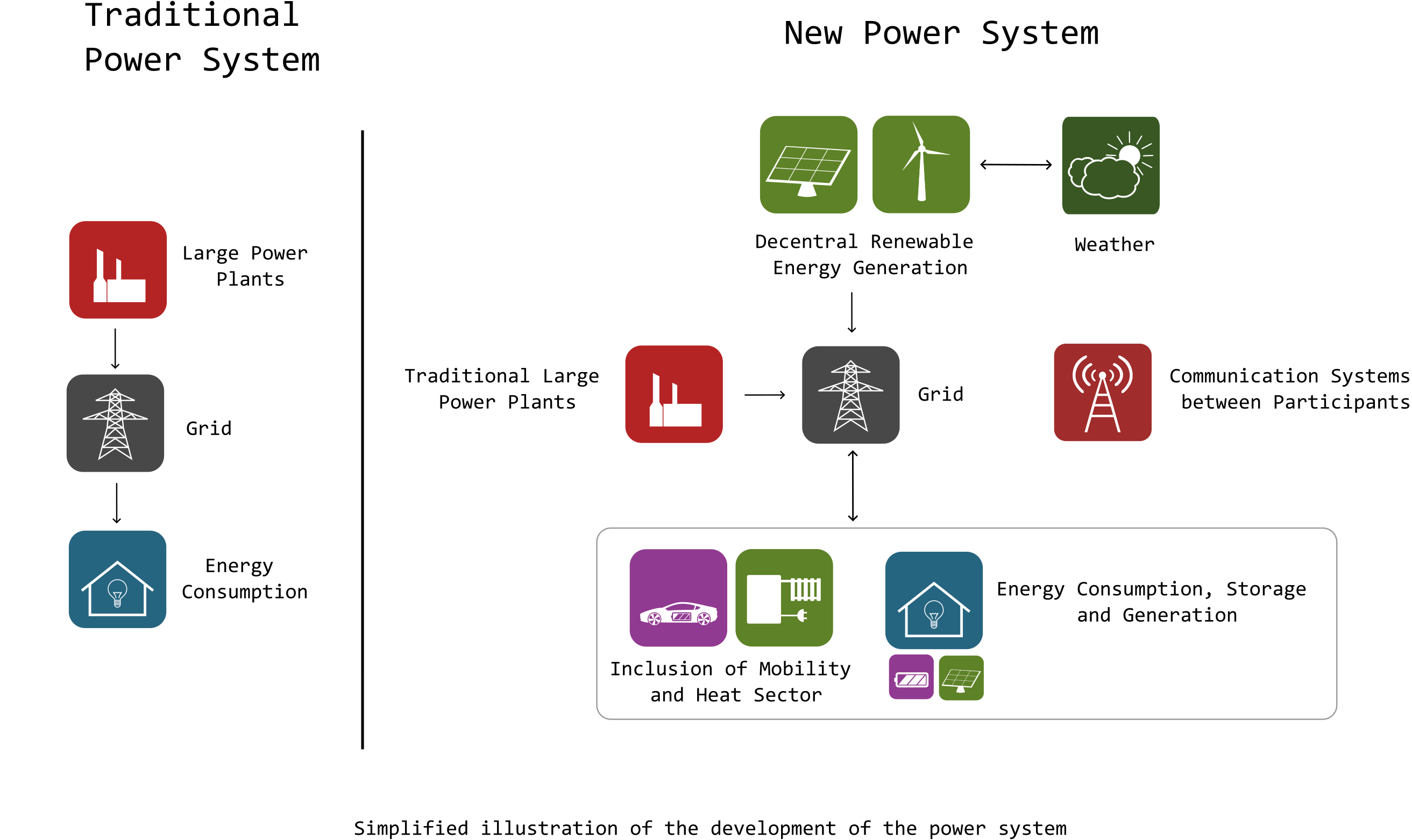
For the development and integration of such ICT-systems and decentralized energy resources, an approach with multiple steps is used. The first concepts of new technologies are typically tested with analytical methods, while comprehensive field tests are at the end of the development process. In-between these two steps, methods are needed which are cheaper and more flexible than field tests, but are also able to model the system complexity better than analytical approaches. The group “Co-Simulation of Multimodal Energy Systems” (COM) is specialized in simulation-based system analysis for the development and validation of new components and architecture for the energy supply system.
What is Co-Simulation?
For the simulation of systems, multiple approaches can be applied. One common option is to model the whole system with all of its components in one simulation tool. Nevertheless, this comes with the drawback that it is difficult to reuse the components and that all components have to be developed together. Especially in complex systems with many components, this approach often exceeds the capacities for one development project. Additionally, a single tool often is not the best choice for modeling all different components. Therefore, co-simulation uses the approach to couple different simulation models and components to represent the whole system. In the domain of energy systems, there are for example the energy grid, renewable electricity generation, weather data, a market simulation, a consumption simulation or a simulation of the ICT components. As depicted in the following figure, these components are coupled via a common framework. This framework does the orchestration and enables the communication between the simulators. This task can, for example, be done by our tool “mosaik”.
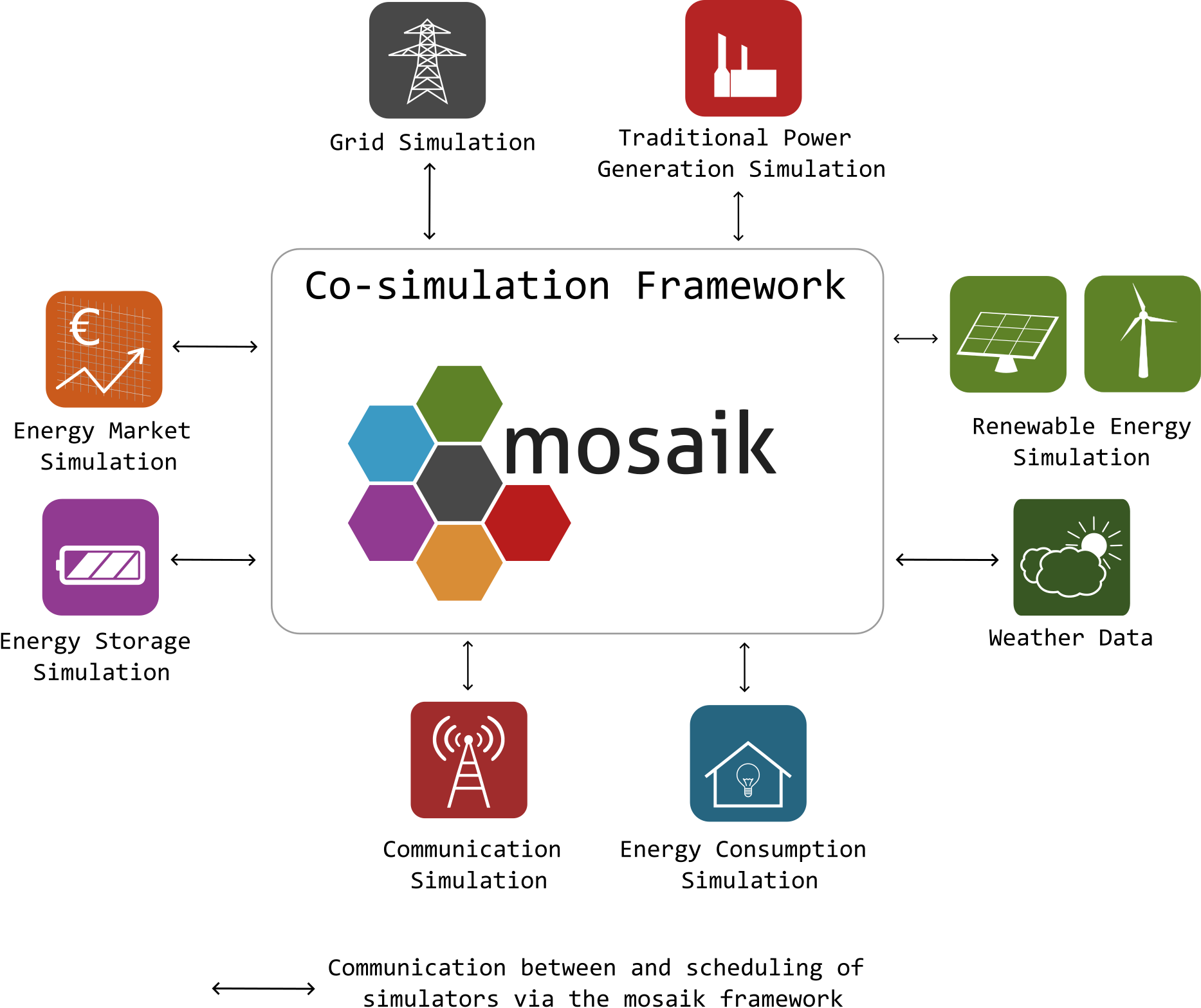
Some examples of the central building blocks of a co-simulation are mentioned above. When these components work together, insights can be generated which would not be possible if the single components are only used on their own. This can be seen in the example below. Here, solar power systems, a simple grid as well as private households as consumers are simulated together. Combined with weather data, it can be observed which parts of the grid are overloaded. Using this approach, scenarios can be build to analyze future developments and to calculate necessary adjustments in the grid. Our contribution for these simulations is the simple and flexible possibility to combine different components such as grid, solar, and household models, among others. Additionally, we work on the framework to allow the integration of control algorithms, e.g., to manage the behavior of a battery system. Generally speaking, we work on the generic framework for co-simulations.
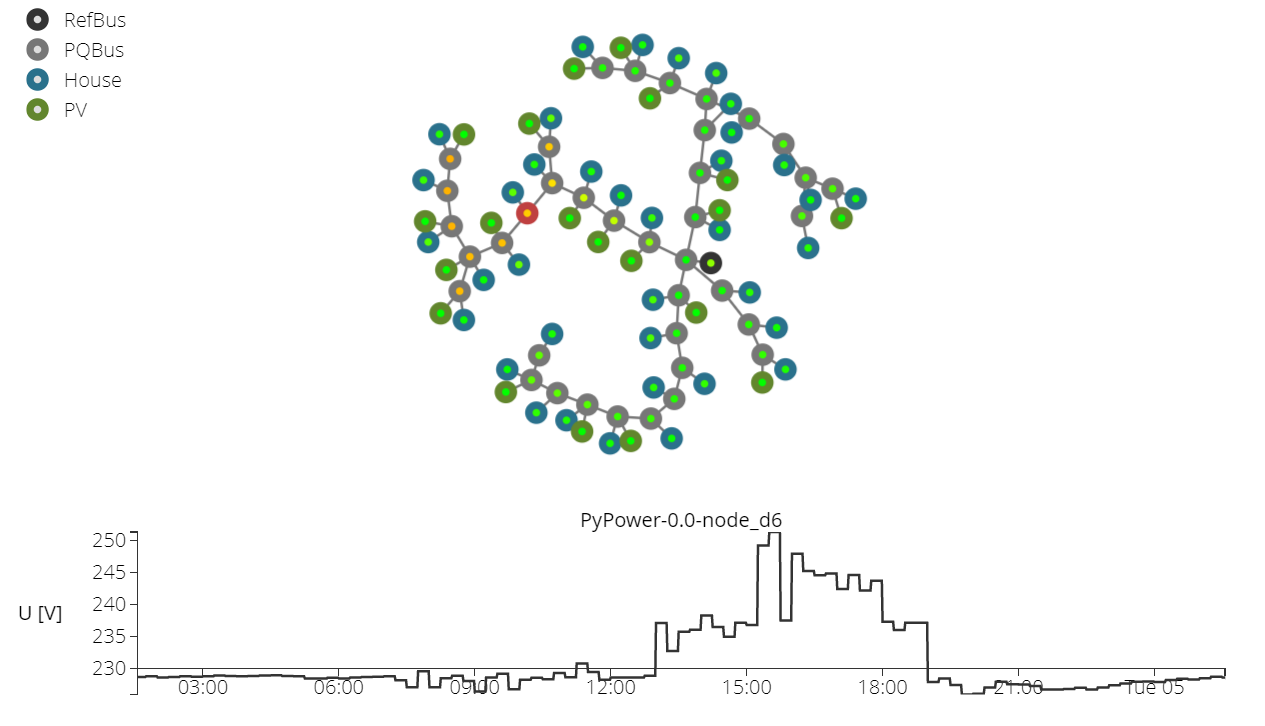
If you want to try the example, you can do so here: https://mosaik.offis.de/live-demo/
Research Focus of the Group
Development of the Co-Simulation Framework mosaik
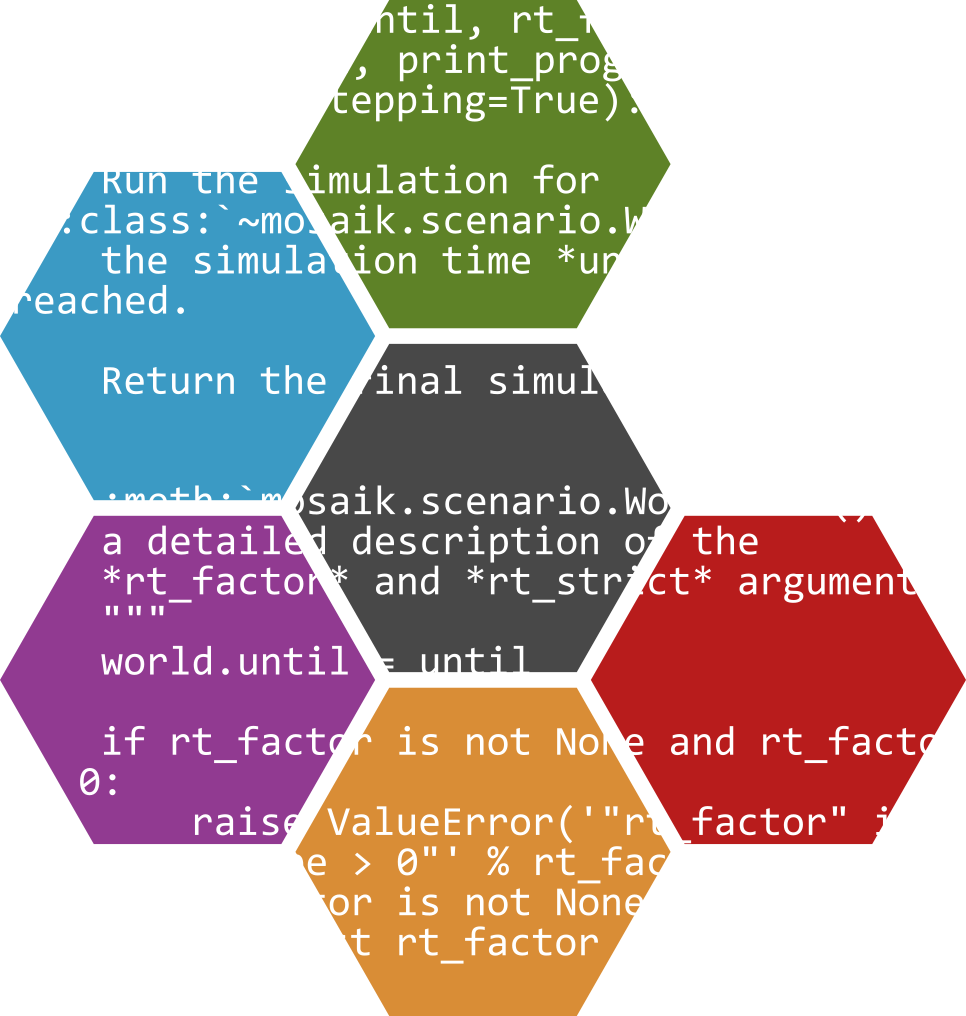
We work in the core functionality of mosaik to extend the possibilities and usability of co-simulations. We do the whole development of mosaik open-source, so that we allow researchers worldwide to run co-simulations. With the tools that we develop, the researchers can analyze scenarios in the energy context more simply and in more detail, but are not limited to the energy domain. We invite external developers to take part at the development of mosaik. The repository can be found here: https://gitlab.com/mosaik/mosaik
Topics for future developments are, next to the usability and performance, also simulation-as-a-service, distributed simulations, automaton of simulation and platforms to share simulation models.
More information about mosaik can also be found on its website: https://mosaik.offis.de/
Development of the mosaik ecosystem
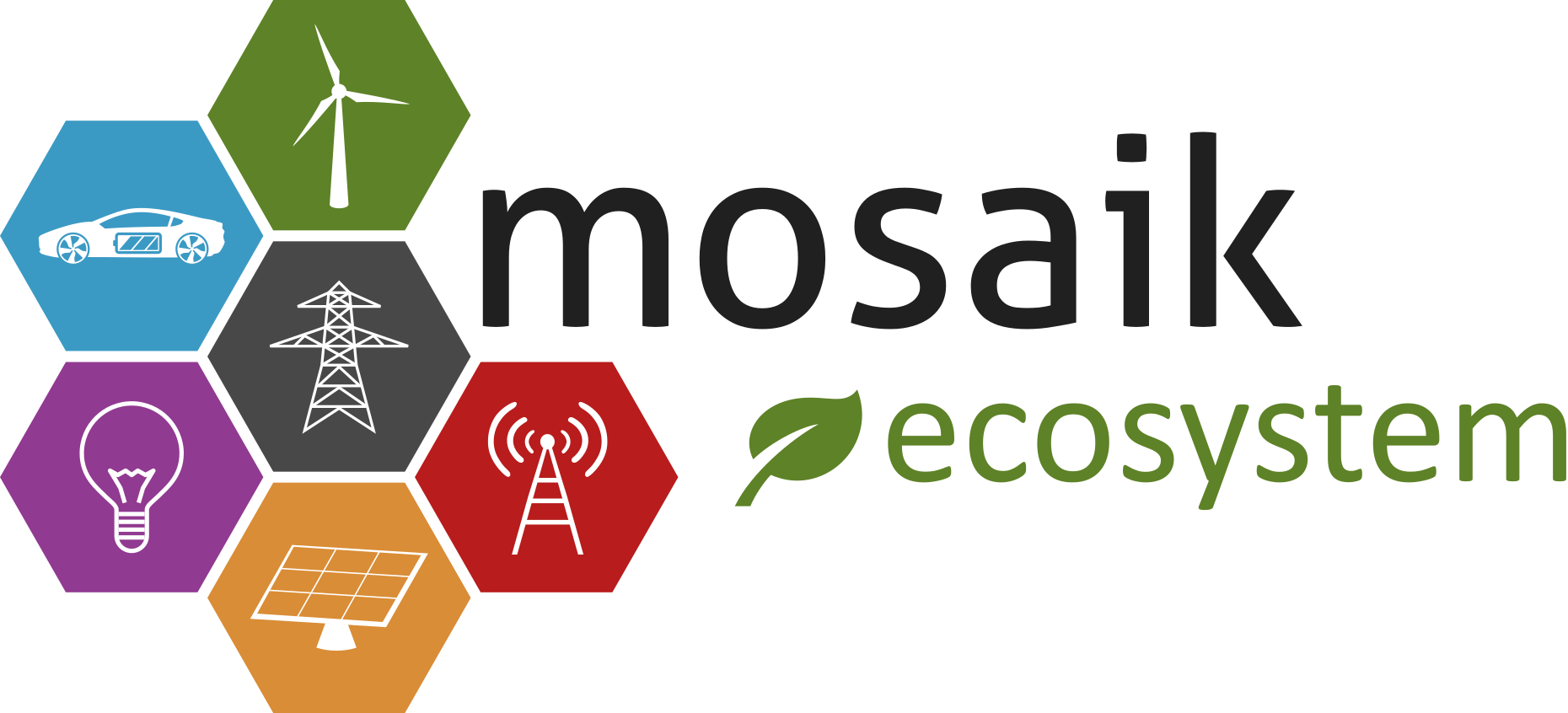
A strength for mosaik is the large number of adapters to other tool and models for different components. Among others, these are pandapower for grid calculations, OMNeT++ for communication simulation as well as adapters to connect Matlab, Java, and other programming languages. We continuously extend this ecosystem to extend the possibilities of mosaik. Large parts of the mosaik ecosystem can be found here: https://gitlab.com/mosaik
Application of mosaik for Scenario Creation
If its the building process of a hydrogen economy or the analysis of scenarios for future urban neighborhoods: we use mosaik and its ecosystem to model and simulate new scenarios to gain new insights in future energy systems. Additionally, by using mosaik we can gain insights in the strengths and weaknesses of mosaik and can better plan the further development of the tool.
Selection of Completed Projects
MEO
The transition of our energy system towards renewable energy resources issues many challenges to us. With classical energy system analysis, models are use to answer many different questions, e.g., to find cost-optimal grid extension plans. These models always include, due to the strategic, long time horizon they cover, broad simplifications in their complexity. Therefore, they are not suitable for the analysis of operational effects on the electricity grid.
In the project “MEO – Model Experiments in the Operational Energy System Analysis”, which was conducted from 2019 to 2021, scenarios were developed that can be used to analyze operational effects of energy producers and consumers in a high temporal and geographic resolution. As an example, the impact of combined heat and power plants on the electricity grid and heat network can be analyzed.
With the help of the developed scenarios, the models of the project partners were compared to each other. OFFIS used the open-source tool “mosaik” for the comparison. In the project, we used existing models in mosaik and had the opportunity to couple new tools to our framework. Additionally, we analyzed if the different tools got the same results and found out in which scenarios the tools got the same results and in which features they are different.
OFFIS was able to continue the development of mosaik in this project and was also able to extend the experience in the research field of operational energy system analysis.
![[Translate to english:]](/fileadmin/_processed_/9/d/csm_mosaik_logo_wo_text_0f09d9cb3f.png)
Projects 
2023
National Research Data Infrastructure for the Interdisciplinary Energy System Research
Duration: 2023 - 20282022
Hydrogen for Bremen’s industrial Transformation - Ein Initialimpuls für die Wasserstoff-Hanse
Duration: 2022 - 2026
Resilienz im digitalisierten Stromsystem: Toolbox zur Bewertung von Systemdienstleistungsmärkten
Duration: 2022 - 20242021
2020
2019
Publications 
2025
Holly, Stefanie and Pechan, Anna and Schulte, Eike and Palovic, Martin and Buchmann, Marius; 2025 IEEE Kiel PowerTech; June / 2025
Matteo Barsanti and Jan Sören Schwarz and Faten Ghali and Selin Yilmaz and Sebastian Lehnhoff and Claudia R. Binder; Energy Research & Social Science; 01 / 2025
Kasturi, Pranay and Torio, Herena and Schwarz, Jan Soeren; Proceedings of EuroSun 2024; 2025
2024
Schwarz, Jan Soeren and Pham, Minh Cong and Tran, Quoc Tuan and Heussen, Kai; 2023 Asia Meeting on Environment and Electrical Engineering (EEE-AM); 01 / 2024
Eike SchulteStephan Balduin; The 38th Annual European Simulation and Modelling Conference 2024; 10 / 2024
2023
Adelt, Fabian and Barsanti, Matteo and Hoffmann, Sebastian and Sarma, Debopama Sen and Schwarz, Jan Sören and Vermeulen, Ben and Warendorf, Tom and Binder, Claudia and Droste-Franke, Bert and Lehnhoff, Sebastian and Myrzik, Johanna and Rehtanz, Christian and Weyer, Johannes ; Advances in Social Simulation; September / 2023
Rebeca Ramirez Acosta; Chathura Wanigasekara; Sebastian Lehnhoff; Jorge Marx Gómez; September / 2023
Ramirez, Rebeca and Wanigasekara, Chathura and Frost, Emilie and Brandt, Tobias and Lehnhoff, Sebastian and Büskens, Christof; Available at SSRN 4313578; May / 2023
Maurer, Florian and Miskiw, Kim K. and Ramirez Acosta, Rebeca and Harder, Nick and Sander, Volker and Lehnhoff, Sebastian; Energy Informatics; 2023
2022
Rebeca Ramirez Acosta; Sebastian Lehnhoff; Jorge Marx Gomez; 18th International Conference on European Electricity Market, (EEM); 2022
